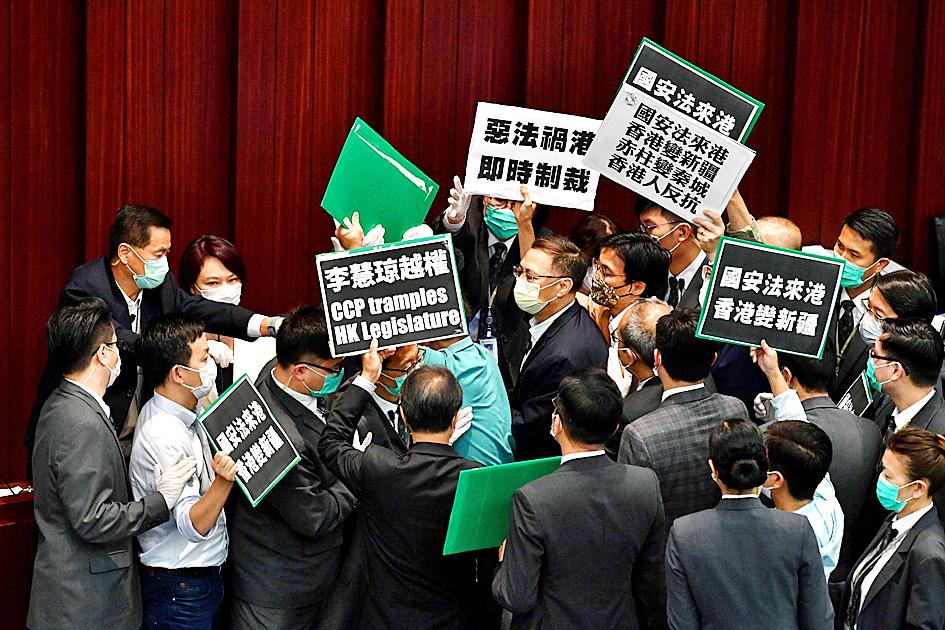Hong Kong pro-democracy campaigners yesterday vowed to take to the streets in protest over what they said was China’s fiercest assault on the territory’s treasured autonomy with its move to impose a security law.
The proposal for the legislation — expected to ban treason, subversion and sedition — was introduced at the opening of the National People’s Congress in Beijing yesterday.
It followed repeated warnings from Chinese leaders that they would no longer tolerate dissent in Hong Kong, which endured seven months of pro-democracy protests last year.

Photo: AFP
“This is the largest nuclear weapon the Chinese Communist Party has used in its mutual destruction of Hong Kong,” said Jimmy Sham (岑子杰), convener of the Civil Human Rights Front, which organized the rally that started last year’s unrest.
Democracy advocate Joshua Wong (黃之鋒) said that China’s message to the protesters was clear.
“Beijing is attempting to silence Hong Kongers’ critical voices with force and fear,” Wong wrote on Twitter, while also expressing defiance. “HKers will not scare off in the face of wolf warrior policy.”
Hong Kong has been allowed a limited form of autonomy since returning from British to Chinese rule in 1997, with those unique freedoms enshrined under a “one country, two systems” agreement.
However, a huge pro-democracy movement has built in the face of fears that China has been steadily eroding those freedoms.
The Chinese Communist Party yesterday made it clear that the planned law was aimed at quashing the democracy movement.
“We must take powerful measures to lawfully prevent, stop and punish them,” National People’s Congress Standing Committee Vice Chairman Wang Chen (王晨) said, referring to “anti-China” forces.
Article 23 of Hong Kong’s Basic Law states that the territory must enact a law to prohibit “treason, secession, sedition [and] subversion” against the Chinese government, but the clause has never been implemented due to opposition from Hong Kongers fearful it would destroy their civil rights.
An attempt to have Article 23 pass the Hong Kong Legislative Council in 2003 was shelved after about 500,000 people took to the streets in protest against it.
China’s move would circumvent the Hong Kong Legislative Council by having it imposed by Beijing.
Wang said Hong Kong’s delays in implementing the security law had forced the Chinese leadership to take action.
“More than 20 years after Hong Kong’s return, however, relevant laws are yet to materialize due to the sabotage and obstruction by those trying to sow trouble in Hong Kong and China at large, as well as external hostile forces,” he said.
The US reacted swiftly, with US Department of State spokeswoman Morgan Ortagus warning that imposing such a law would be “highly destabilizing, and would be met with strong condemnation from the United States and the international community.”

PREPAREDNESS: Given the difficulty of importing ammunition during wartime, the Ministry of National Defense said it would prioritize ‘coproduction’ partnerships A newly formed unit of the Marine Corps tasked with land-based security operations has recently replaced its aging, domestically produced rifles with more advanced, US-made M4A1 rifles, a source said yesterday. The unnamed source familiar with the matter said the First Security Battalion of the Marine Corps’ Air Defense and Base Guard Group has replaced its older T65K2 rifles, which have been in service since the late 1980s, with the newly received M4A1s. The source did not say exactly when the upgrade took place or how many M4A1s were issued to the battalion. The confirmation came after Chinese-language media reported

A Ministry of Foreign Affairs official yesterday said that a delegation that visited China for an APEC meeting did not receive any kind of treatment that downgraded Taiwan’s sovereignty. Department of International Organizations Director-General Jonathan Sun (孫儉元) said that he and a group of ministry officials visited Shenzhen, China, to attend the APEC Informal Senior Officials’ Meeting last month. The trip went “smoothly and safely” for all Taiwanese delegates, as the Chinese side arranged the trip in accordance with long-standing practices, Sun said at the ministry’s weekly briefing. The Taiwanese group did not encounter any political suppression, he said. Sun made the remarks when

The Taiwanese passport ranked 33rd in a global listing of passports by convenience this month, rising three places from last month’s ranking, but matching its position in January last year. The Henley Passport Index, an international ranking of passports by the number of designations its holder can travel to without a visa, showed that the Taiwan passport enables holders to travel to 139 countries and territories without a visa. Singapore’s passport was ranked the most powerful with visa-free access to 192 destinations out of 227, according to the index published on Tuesday by UK-based migration investment consultancy firm Henley and Partners. Japan’s and

BROAD AGREEMENT: The two are nearing a trade deal to reduce Taiwan’s tariff to 15% and a commitment for TSMC to build five more fabs, a ‘New York Times’ report said Taiwan and the US have reached a broad consensus on a trade deal, the Executive Yuan’s Office of Trade Negotiations said yesterday, after a report said that Washington is set to reduce Taiwan’s tariff rate to 15 percent. The New York Times on Monday reported that the two nations are nearing a trade deal to reduce Taiwan’s tariff rate to 15 percent and commit Taiwan Semiconductor Manufacturing Co (TSMC, 台積電) to building at least five more facilities in the US. “The agreement, which has been under negotiation for months, is being legally scrubbed and could be announced this month,” the paper said,